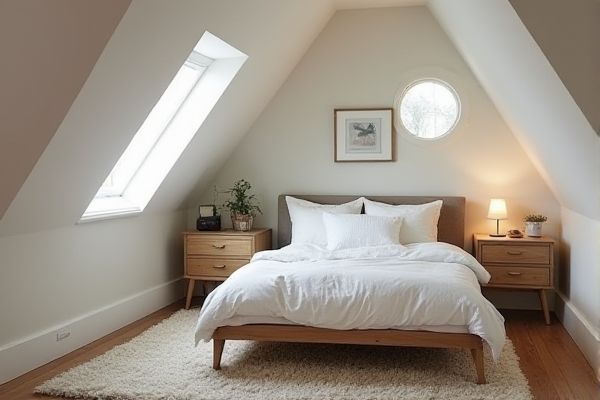
Eave storage maximizes space under the sloped roof by creating built-in cupboards, ideal for keeping your belongings organized and out of sight. Discover how choosing between eave storage and a dormer nook can impact your home's functionality and aesthetic by reading the rest of the article.
Table of Comparison
| Feature | Eave Storage | Dormer Nook |
|---|---|---|
| Location | Under the sloping roof edges (eaves) | Within a dormer extension protruding from the roof |
| Space Utilization | Utilizes low-height areas, good for small items | Offers more vertical space, suitable for larger storage or seating |
| Natural Light | Typically limited or no natural light | Often includes windows, providing natural light |
| Accessibility | Often requires bending or crawling | More accessible and comfortable entry |
| Cost | Lower cost, uses existing structure | Higher cost due to construction of dormer |
| Design Impact | Minimal exterior impact | Alters roofline, can enhance exterior aesthetics |
Introduction to Eave Storage and Dormer Nooks
Eave storage utilizes the sloped areas beneath a roof's overhang, maximizing space that is often overlooked in traditional rooms. Dormer nooks are small extensions built out from a sloping roof, creating extra room with vertical walls and natural light. You can enhance usable storage or cozy seating areas by strategically incorporating either eave storage or dormer nooks in your home design.
Defining Eave Storage: Function and Form
Eave storage utilizes the sloped area under the roofline to maximize space without altering the room's footprint, offering discreet compartments for seasonal items, tools, or extra linens. This storage solution balances function and form by integrating seamlessly into the architecture, preserving clean lines while providing practical utility. Your home benefits from eave storage's efficient use of otherwise wasted space, enhancing both organization and aesthetic appeal.
What is a Dormer Nook?
A dormer nook is a small, recessed area created by the extension of a dormer window from a sloped roof, providing additional usable space within an attic or upper floor. Unlike eave storage, which utilizes the lower, often cramped spaces beneath the roof's edge, dormer nooks offer more headroom and natural light, making them ideal for cozy seating, storage, or decorative purposes. These architectural features enhance functionality without compromising the exterior aesthetics of the building.
Space Optimization: Eave Storage vs Dormer Nook
Eave storage maximizes under-roof areas by utilizing sloped ceiling spaces for concealment and organization, ideal for seasonal items and less-frequent use. Dormer nooks create more functional space by extending headroom and natural light, making them suitable for cozy reading spots or built-in seating. Your choice depends on whether you prioritize hidden storage capacity or enhanced livable area and aesthetics.
Design Aesthetics: Visual Appeal Comparison
Eave storage offers a sleek, streamlined look that seamlessly integrates with your roofline, enhancing overall architectural harmony. Dormer nooks provide a charming, dynamic visual appeal by breaking up roof mass and creating cozy, inviting spaces with natural light. Choosing between them depends on whether you prefer minimalist elegance or distinctive character in your home's design aesthetics.
Storage Capacity: Eave Storage vs Dormer Nook
Eave storage maximizes under-roof space with extended shelving or built-in cabinets, offering a larger and more flexible storage capacity compared to dormer nooks. Dormer nooks provide cozier, often shallower compartments that fit smaller items but lack the volume that eaves typically allow. For optimizing your room's storage potential, eave storage solutions accommodate bulkier belongings more efficiently than dormer nook options.
Natural Light and Ventilation Considerations
Eave storage typically offers limited natural light and ventilation due to its placement under the roof edge, often resulting in darker, more enclosed spaces. Dormer nooks enhance natural light and airflow by incorporating vertical windows into the roofline, improving ventilation and creating brighter, more usable storage areas. Choosing dormer nooks over eave storage maximizes daylight penetration and air circulation, contributing to a healthier and more comfortable environment.
Cost and Installation Differences
Eave storage generally costs less to install due to its simpler construction within existing roof slopes, while dormer nooks require additional framing and roofing modifications, increasing labor and materials expenses. Installation of eave storage typically involves minimal structural changes, making it less time-consuming and more budget-friendly. Dormer nooks, by contrast, involve cutting into the roofline to create vertical space, which demands skilled labor and extended project duration, driving up overall costs.
Best Uses for Eave Storage and Dormer Nooks
Eave storage is ideal for maximizing space in areas with sloped ceilings, perfect for storing seasonal items, shoes, and linens where vertical clearance is limited. Dormer nooks offer a cozy, well-lit space suitable for small desks, reading corners, or decorative displays, making them valuable for enhancing functionality and aesthetics in attic conversions. Both options optimize otherwise underutilized areas, with eave storage favoring concealed practicality and dormer nooks providing versatile living enhancements.
Choosing Between Eave Storage and Dormer Nooks: Key Factors
Choosing between eave storage and dormer nooks involves assessing ceiling height, accessibility, and available space under roof slopes. Eave storage maximizes under-rafter areas, ideal for smaller items but with restricted headroom, while dormer nooks provide more vertical space and natural light, enhancing usability and comfort. Consider the intended use, ease of access, and structural modifications needed to determine the most efficient storage solution in attic or loft conversions.
 homyna.com
homyna.com